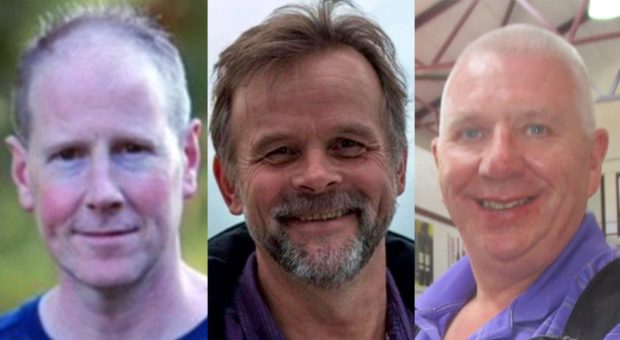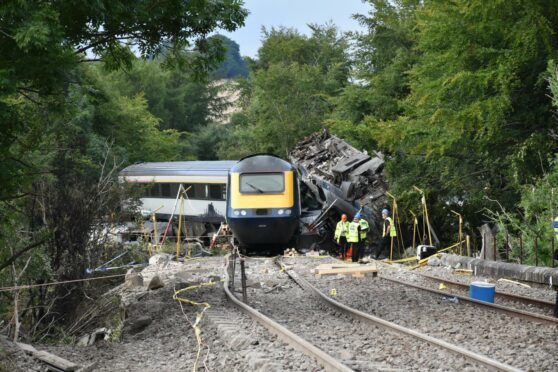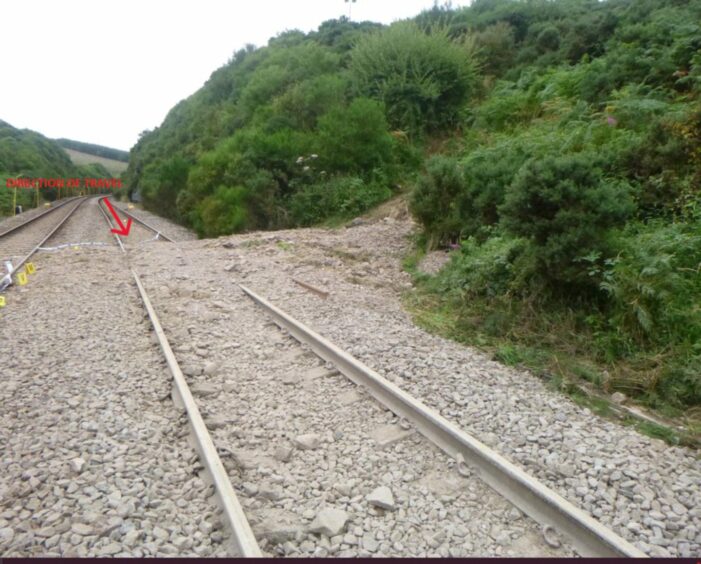Network Rail was today fined £6.7 million over failings that caused the Stonehaven rail tragedy.
Three people died and six others were injured in the August 2020 crash, which happened when the 6.54am train from Stonehaven struck a landslide on the track at Carmont.
At the High Court in Aberdeen yesterday the rail body admitted failing to conduct itself in a way that would prevent people from the risk of serious injury and death.
The court case follows two lengthy probes into the circumstances surrounding the tragedy, which killed the train’s driver Brett McCullough, conductor Donald Dinnie and passenger Christopher Stuchbury.
Judge Lord Hugh Matthews said he was “quite satisfied that culpability is high” but that the weather conditions that day were “unprecedented”.
Handing down a fine of £6.7m, the judge said: “Three people died and their families left without loved ones. The traumatic events also caused the survivors to suffer physically, psychologically and financially.
“No punishment I could give can lessen their suffering – particularly when they know the crash could have been avoided.”
He said “opportunities to take appropriate action were missed” but “Network Rail has made considerable efforts since the tragedy to ensure it could never happen again”.
The judge said the fine would have been £10m, had the case gone to trial.
At the start of yesterday’s hearing, Network Rail admitted a catalogue of failures in the run-up to the tragedy.
The court heard Network Rail built a drain at the crash scene upside down and didn’t check it was built properly.
It also didn’t create a computer record of the drain so its staff didn’t know it existed.
It was this drain that was overwhelmed in a storm and washed stones onto the track, which caused the derailment.
Network Rail bosses also failed to train staff how to use weather forecasting software – which would have allowed them to call on an emergency meeting on a day of “biblical” rain before the crash.
Network Rail’s ‘deepest and most profound sympathies’ to families of victims
Today, Network Rail’s defence counsel Peter Gray offered the companies sincere condolences to the six survivors and the families of the three people who died in the crash.
Mr Gray told the court: “It difficult to comprehend the sense of grief and loss that must have been felt at the time, and I am sure continues to be felt, by all of those who lost loved ones.
He added that Network Rail wished to extend “its deepest and most profound sympathies” to the families of those who died and “its deepest and most heartfelt regrets” to those who were injured in the crash.
Describing the events of the derailment as an “extreme event”, Mr Gray stated that the “challenges of climate change” and heavy rainfall had played a significant role, alongside failings “which the company must, and does, accept”.
He said: “These admitted failings and the consequences that followed – in particular that no records of the draining asset were subsequently held for the purposes of inspection and maintenance – were in no way deliberate, nor has such a suggestion ever been made, either by the Rail Accident Investigation Branch, and is likely to have arisen by a genuine oversight by the company.
“I would invite m’lord to accept that the remorse felt by Network Rail could not be greater or more genuine.”
He added that Network Rail took “immediate and comprehensive steps” to address the firm’s “admitted failings” and that it had “total determination to learn lessons” from the tragedy.
Fatal Accident Inquiry will now be held
Speaking after the sentencing, Debbie Carroll, who leads on health and safety investigations for the COPFS, said: “This prosecution is the culmination of a highly complex and thorough large-scale investigation by Police Scotland, British Transport Police and the Office of Rail and Road (ORR) under the direction of the Procurator Fiscal.
“There have already been a number of lessons learned and industry-wide changes made following this incident and the statutory safety investigation conducted by the Rail Accident Investigation Branch.
“To further serve the public interest a Fatal Accident Inquiry has been instructed to examine the full circumstances surrounding these tragic deaths, putting all relevant information into the public domain and help avoid such an incident happening again in the future.”
Asked whether he believed the amount imposed upon Network Rail by Judge Matthews was enough, Detective Superintendent Alex Dowall said: “The scale of the fine is a matter for the court.
“Our focus has been with the families and that would be a matter for them.
“But I think we would all agree that no figure can bring back their loved ones or give them any solace over what they’ve gone through.”
Union boss: ‘Law must be toughened up’
Victims of the tragedy yesterday gave moving accounts of their ordeals to the court yesterday.
Mick Lynch, Secretary-General of the RMT union, said: “Network Rail’s attitude to safety has been abysmal with staff shortages and 20 recommendations by the Rail Accident Investigation Branch (RAIB) for improvements, most of which were completely ignored by the public body.
“Currently there are massive shortages of staff on the ground, sometimes with a couple of people responsible for hundreds of miles of rail track, often located in areas at high risk of flooding and landslides.
“The law must be toughened up regardless of the outcome of this case and corporate manslaughter must be made an option in similar cases in the future.”



